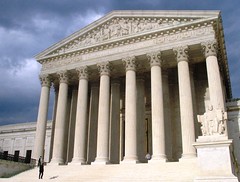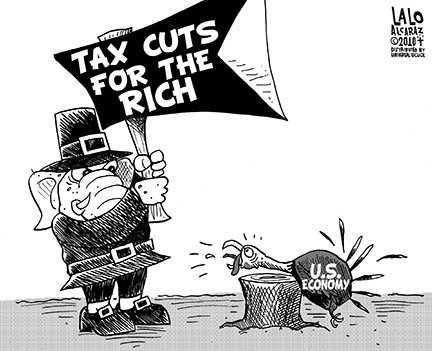Read the report.

Business lobbyists are pushing Congress to enact tax “extenders” — a bill to extend several temporary tax breaks for business that expire at the end of this year. A new report from Citizens for Tax Justice examines the largest of those provisions, the federal research and experimentation tax credit, a tax subsidy that is supposed to encourage businesses to perform research that benefits society. The report explains that the research credit is riddled with problems and should be either reformed dramatically or allowed to expire.
Created in 1981, the credit immediately became the subject of scandals when it was claimed by businesses that no ordinary American would consider deserving of a tax subsidy (or any government subsidy) for research — like fast food restaurants, fashion designers and hair stylists.
Reforms enacted in 1986 were supposed to prevent these abuses, but there is evidence that corporate tax planners have often out-maneuvered the reforms.
The report explains that many of the problems it describes are the work of accounting firms that wrote the book on abusing the credit — and quite literally wrote the credit regulations as well. The credit’s rules are so lax thanks in large part to Mark Weinberger, a Bush top Treasury appointee who had previously lobbied for a broader definition of “research” while he was at Ernst and Young and, after he left the Treasury, returned to a grateful Ernst and Young where he was eventually promoted to CEO.
Another firm behind abuses of the credit is Alliantgroup, a tax consulting firm with former IRS Commissioner Mark W. Everson serving as its vice chairman and Dean Zerbe, former senior counsel to former Senate Finance Committee Chairman Charles Grassley, as its managing director.
Members of Congress have pushed to remove what reasonable restrictions remain on the research credit. For example, the report explains that Senators Charles Grassley and Amy Klobuchar have both called on the Treasury Department to make it easier for businesses to claim the credit on amended returns for research done in previous years, which cannot possibly achieve the goal of providing an incentive to do research. (A business’s research cannot possibly be the result of a tax incentive that the business was unaware of until years after the research was carried out.)
Meanwhile, a report coauthored by former Clinton adviser Laura D’Andrea Tyson argues that Congress should simply repeal the reforms of 1986 and make legal the abuses that the IRS is trying to stop.
The CTJ report explains that even when the credit is claimed by companies doing legitimate research, it’s difficult to believe that the research was a result of the credit.
 Congress should let the research credit expire, and redirect the billions of dollars that it costs into true, basic, truly scientific research, which businesses rarely engage in because the payoffs often take years to arrive.
Congress should let the research credit expire, and redirect the billions of dollars that it costs into true, basic, truly scientific research, which businesses rarely engage in because the payoffs often take years to arrive.
The report explains that if lawmakers insist on extending the research credit once again when it expires at the end of 2013, they should address three broad problems. If these problems are not addressed, then the credit should be allowed to expire.
Read the report.
 remain firmly shut. Nixon has called a special legislative session to urge the Missouri legislature to approve tax cuts totaling $1.7 billion , also geared toward Boeing and other aerospace companies.
remain firmly shut. Nixon has called a special legislative session to urge the Missouri legislature to approve tax cuts totaling $1.7 billion , also geared toward Boeing and other aerospace companies. harmless pledge often works out to be what Mary Poppins called a “pie crust promise”—easily made and easily broken. Just nine years after Governor Richardson burnished his tax-cutting credentials by exempting groceries from local (and state) gross receipts taxes—while simultaneously implementing a “hold harmless” provision so that locals wouldn’t feel the pain of losing such a large chunk of their tax base—a law is now in place that will completely phase out the hold-harmless aid to locals between 2015 and 2030. A recent Santa Fe New Mexican
harmless pledge often works out to be what Mary Poppins called a “pie crust promise”—easily made and easily broken. Just nine years after Governor Richardson burnished his tax-cutting credentials by exempting groceries from local (and state) gross receipts taxes—while simultaneously implementing a “hold harmless” provision so that locals wouldn’t feel the pain of losing such a large chunk of their tax base—a law is now in place that will completely phase out the hold-harmless aid to locals between 2015 and 2030. A recent Santa Fe New Mexican 
 In what has been a cherished annual tradition for tax accountants everywhere, the day is approaching—January 1, to be precise—when dozens of temporary federal income tax provisions are set to expire. The so-called “extenders”—tax breaks enacted by Congress on a temporary basis and extended at the last minute, usually because lawmakers can’t find a way to pay for making them permanent—include a rogue’s gallery of ineffective giveaways ranging from the
In what has been a cherished annual tradition for tax accountants everywhere, the day is approaching—January 1, to be precise—when dozens of temporary federal income tax provisions are set to expire. The so-called “extenders”—tax breaks enacted by Congress on a temporary basis and extended at the last minute, usually because lawmakers can’t find a way to pay for making them permanent—include a rogue’s gallery of ineffective giveaways ranging from the  tax loopholes that most small businesses can’t use and want to close.
tax loopholes that most small businesses can’t use and want to close.
 Congress should let the research credit expire, and redirect the billions of dollars that it costs into true, basic, truly scientific research, which businesses rarely engage in because the payoffs often take years to arrive.
Congress should let the research credit expire, and redirect the billions of dollars that it costs into true, basic, truly scientific research, which businesses rarely engage in because the payoffs often take years to arrive.

 Voters in 36 states will be choosing governors next year. Over the next several months, the Tax Justice Digest will be highlighting 2014 gubernatorial races where we expect taxes to be a key issue. Today’s post is about the race for the Governor’s mansion in Wisconsin.
Voters in 36 states will be choosing governors next year. Over the next several months, the Tax Justice Digest will be highlighting 2014 gubernatorial races where we expect taxes to be a key issue. Today’s post is about the race for the Governor’s mansion in Wisconsin.  Update: Pennsylvania Governor Tom Corbett signed the gas tax increase described below into law on November 25, 2013.
Update: Pennsylvania Governor Tom Corbett signed the gas tax increase described below into law on November 25, 2013.